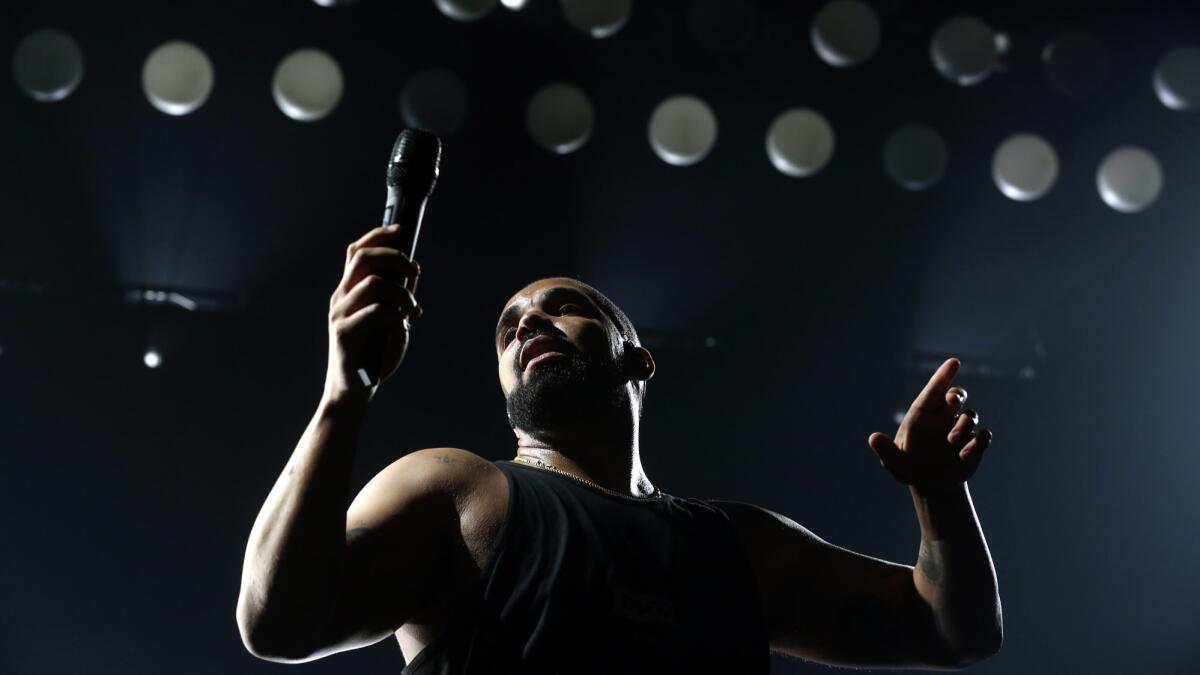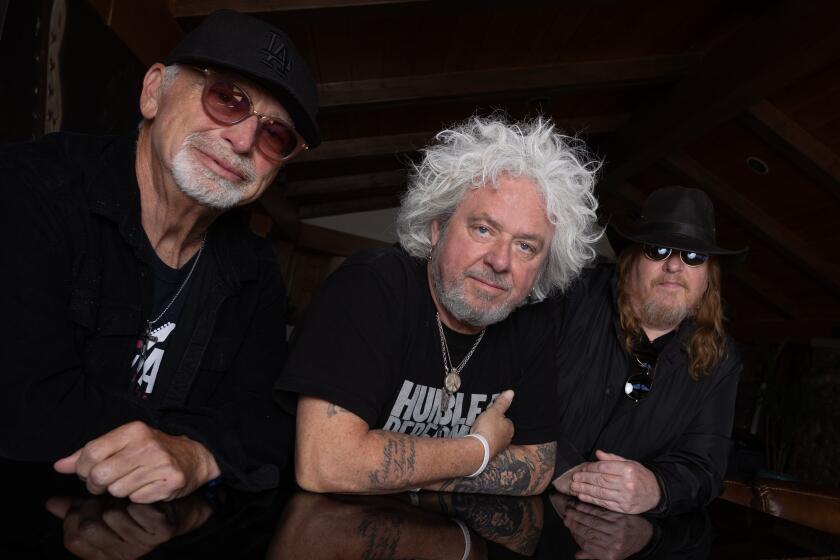Call it, maybe: Why no single tune felt like 2016’s song of the summer

After three of the weirdest, most discombobulating months in recent American history, summer officially ends Wednesday — though it may not feel like it given the steamy weather in Los Angeles and the fact we’re still nowhere near the end of this divisive election cycle.
Yet autumn’s arrival does allow us to close at least one matter, and that’s this year’s song of the summer.
Right?
An unscientific designation that nonetheless comes laden with numbers, the song of the summer refers to that piece of music that dominates the period from June to September — the one tune that, for better or worse, attains an inescapability in the spaces we take to in the hot months: barbecues, theme parks, pool parties.
Think “Call Me Maybe” by Carly Rae Jepsen in 2012, or the Black Eyed Peas’ “I Gotta Feeling” in 2009.
Think “California Gurls.” Or “Jessie’s Girl.”
Think “Hot in Herre.”
Sometimes the song of the summer sticks around, maybe even becomes the song of the year, as with Rihanna’s “Umbrella” in 2007.
Other times it evaporates like water droplets on a pool ring. (Come back, “Party Rock Anthem” — we need your heedless optimism.)
Either way, the anointed track is one that everybody knows, at least for a little while, whether or not they want to. And for 2016, the statistics seem to provide a clear picture: Drake’s “One Dance” was the song of the summer.
But move beyond Drake’s devoted followers and it’s hard to know how many people have even heard “One Dance” — or any of the tunes that came close, numbers-wise, to song-of-the-summer status, including Calvin Harris’ “This Is What You Came For,” Justin Timberlake’s “Can’t Stop the Feeling!” and “Cheap Thrills” by Sia.
“This summer you didn’t have one easy standout,” said Liv Buli of Next Big Sound, an analytics firm owned by the streaming service Pandora. As an example of that, she pointed to “Blurred Lines,” Robin Thicke’s proudly lascivious soul-funk hit that seemed to soundtrack every ball game, awards show and movie trailer in 2013.
In comparison, Buli said, “there wasn’t one song this year where you were like, ‘I’ve heard it so many times I want to gag.’”
Drake certainly tried. A suitably breezy pop-rap number in which the charismatic Canadian MC describes a seduction on the dance floor, “One Dance” (from Drake’s smash “Views” album) topped Billboard’s Hot 100 chart for 10 weeks. Spotify said it was the most-listened-to track of the summer, with more than 800 million streams.
And when Drake performed the song this month during a sold-out concert at Staples Center, the place went verifiably bananas, as though his fans were savoring one last chance to let loose before the onset of fall.
In a squishier way, though, “One Dance” didn’t really feel like the song of the summer; it didn’t permeate the atmosphere as past songs have, so that you couldn’t avoid them even if you were trying.
Inside Staples, of course, the song was a monster, easily devouring all competitors. But outside?
If it’s true that 2016 didn’t produce a single summer song as ubiquitous as “Blurred Lines” or last year’s champ — the simpering “See You Again” by Wiz Khalifa and Charlie Puth — then what happened, or didn’t happen, to make that so?
Several things — some industrial, some creative.
For starters, it’s not easy for people to reach a consensus on popular music when they can’t even agree on how or where to listen to it.
As The Times’ Randall Roberts recently explained, the streaming era — in which millions of listeners pay around $10 a month to platforms like Spotify and Apple Music for access to their tailored libraries — has effectively de-centered the music business.
No longer do fans congregate in a fixed set of places (record stores, Top 40 radio) to hear music whose popularity is measured by a fixed set of yardsticks (sales and airplay charts).
Now some people listen for free on YouTube, while others turn to satellite radio and still others continue to buy old-fashioned CDs (or even older-fashioned vinyl). And because each of those delivery devices has its own built-in biases, establishing universal awareness for any one song is much more difficult than it used to be.
“There’s sort of a disconnect because we’re looking across metrics that don’t always match up,” said Billboard’s Gary Trust, who added that, in the pre-digital age, sales and airplay were typically aligned.
Yet this summer Timberlake’s song had the biggest sales, Trust said, while Drake’s racked up more radio spins. And a third song, Desiigner’s woozy rap hit “Panda,” was the most-streamed, according to Billboard (which measured other services in addition to Spotify).
Add in the increasing number of artists striking exclusive deals with a single streaming company — as Frank Ocean recently did with Apple Music for his long-awaited album “Blond” — and it’s no wonder that “One Dance” and the rest fell short of the omnipresence that “Blurred Lines” and “Call Me Maybe” enjoyed.
But there were also less quantifiable, more artistic factors at work.
Historically, one distinguishing characteristic of a great summer song has been a certain out-of-nowhere quality — the left-field vibe of Gnarls Barkley’s “Crazy” in 2006, for instance, or “Somebody That I Used to Know,” Gotye’s quirky alt-folk tune from 2012.
John Ivey, program director at L.A.’s influential KIIS-FM (102.7), described the powerful appeal of a song “that makes you say, ‘What is this?’ It’s that thing that makes you investigate further to see whether it’s just a flash in the pan.”
For Ivey, the Chainsmokers tapped into that with their slinky club track “Don’t Let Me Down,” which Spotify ranked as its No. 4 song of the summer.
Yet many of the other big songs of the season lacked the off-kilter aspect that can help make a song go viral.
As one of the most popular artists in the world, Drake was practically destined to score with “One Dance,” an inevitability that provided little encouragement to talk up the song to everyone you know.
Ditto Timberlake with “Can’t Stop the Feeling!,” a blast of euphoric disco-pop so perfectly realized (by a team including the Swedish studio genius Max Martin) that it almost made you want to root against it.
Or maybe it was that euphoria that kept the track — and also the jaunty “One Dance” — from feeling like a real song of the summer.
After all, the last few months have seemed to crawl by in a grim blur of bombings, police shootings, campaign nonsense — even mosquitoes hellbent on human suffering.
You read the news and then you listen to the radio, and you ask: Which of these visions of happiness captured any of that?
Five summer songs that almost were
The record industry — or what’s left of it — may have crowned Drake’s “One Dance” the song of the summer, with Justin Timberlake’s “Can’t Stop the Feeling!” not far behind it. But in a season that seemed to defy old-fashioned consensus, plenty of other tunes were vying for the title as well.
Sia featuring Sean Paul, “Cheap Thrills”
A No. 1 hit on Billboard’s Hot 100, the Australian singer’s latest describes her preparations for a night she plans to spend on the dance floor. “Gotta paint my nails, put my high heels on,” she sings in her trademark slur over a bouncy, dancehall-inflected groove. Yet Sia, one of pop’s savviest operators, also wants to reflect something of our troubled moment. So she has “Cheap Thrills” live up to its title: “I ain’t got cash,” she admits, “but I got you, baby.”
Desiigner, “Panda”
Is there a way to measure the song most often heard blasting through open car windows? If there were, this track by the young Brooklyn rapper would have come out on top. Built on an appealingly rinky-dink beat Desiigner purchased from a guy online, “Panda” first picked up heat on the Internet, then went wide after Kanye West sampled the song on his album “The Life of Pablo.”
Calvin Harris featuring Rihanna, “This Is What You Came For”
The Scottish EDM star struck Top 40 gold when he paired with Rihanna for 2011’s “We Found Love.” And though this sequel — which Harris co-wrote with his ex-girlfriend, Taylor Swift — fails to summon the same stadium-rave intensity, “This Is What You Came For” offers more or less what’s advertised: a syncopated club beat, a sexy-cool vocal and a lyric designed to be chopped into digital smithereens.
Twenty One Pilots, “Ride”
One of the few putative rock acts in the mix for song of the summer, this Ohio duo crashed Spotify’s season-end tally with “Ride,” a grungy reggae jam in which frontman Tyler Joseph describes thinking “about the end just way too much.” It’s a goth-punk idea dressed up in mega-pop threads — and a good example of the left-field summer song.
Charlie Puth featuring Selena Gomez, “We Don’t Talk Anymore”
This sultry duet by Gomez and the baby-faced crooner might’ve been considered a sure thing, given the success last summer of Puth’s “See You Again.” Yet “We Don’t Talk Anymore” didn’t quite make the expected waves, stalling out at No. 10 on the Hot 100. Too bad: It’s an understated gem with lovely singing and synths that echo Fleetwood Mac circa “Tango in the Night.”
Twitter: @mikaelwood
ALSO
Beyoncé lowers the fire but still brings the heat as her Formation tour hits L.A. again
Sunday school on Saturday night: Chance the Rapper brings ‘Coloring Book’ to the Greek
Could Shawn Mendes be the real deal? ‘There’s a reason I have 13 million followers,’ he says
More to Read
The biggest entertainment stories
Get our big stories about Hollywood, film, television, music, arts, culture and more right in your inbox as soon as they publish.
You may occasionally receive promotional content from the Los Angeles Times.











